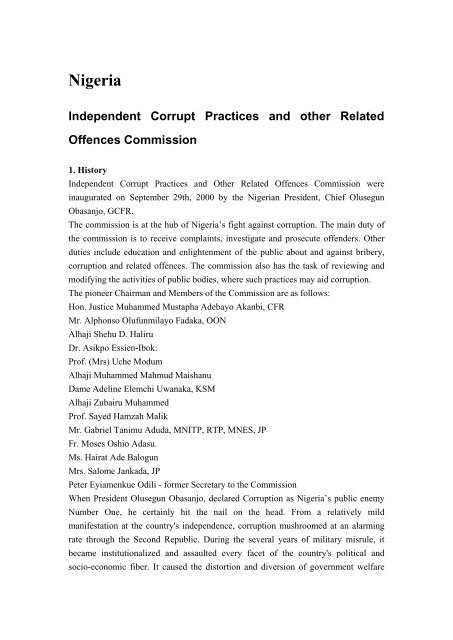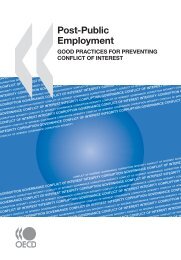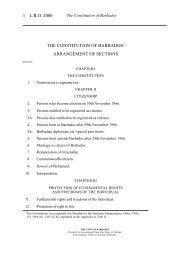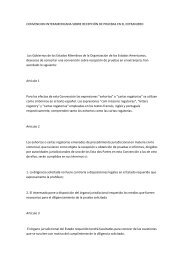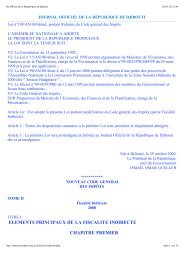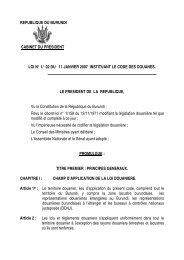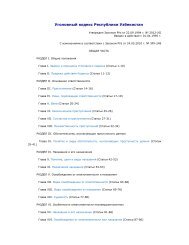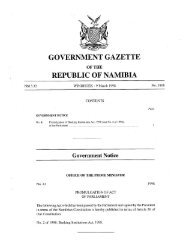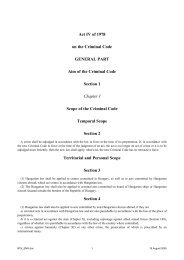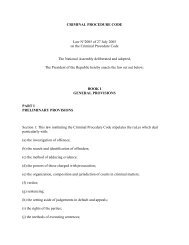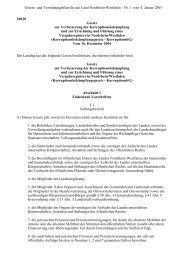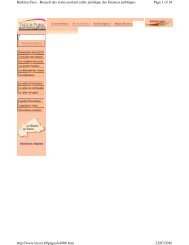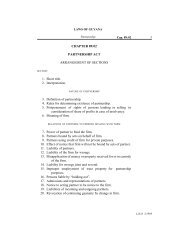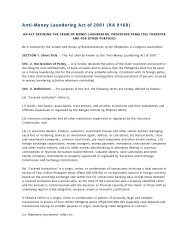Nigeria authorities - On TRACK against Corruption
Nigeria authorities - On TRACK against Corruption
Nigeria authorities - On TRACK against Corruption
You also want an ePaper? Increase the reach of your titles
YUMPU automatically turns print PDFs into web optimized ePapers that Google loves.
<strong>Nigeria</strong><br />
Independent Corrupt Practices and other Related<br />
Offences Commission<br />
1. History<br />
Independent Corrupt Practices and Other Related Offences Commission were<br />
inaugurated on September 29th, 2000 by the <strong>Nigeria</strong>n President, Chief Olusegun<br />
Obasanjo, GCFR.<br />
The commission is at the hub of <strong>Nigeria</strong>’s fight <strong>against</strong> corruption. The main duty of<br />
the commission is to receive complaints, investigate and prosecute offenders. Other<br />
duties include education and enlightenment of the public about and <strong>against</strong> bribery,<br />
corruption and related offences. The commission also has the task of reviewing and<br />
modifying the activities of public bodies, where such practices may aid corruption.<br />
The pioneer Chairman and Members of the Commission are as follows:<br />
Hon. Justice Muhammed Mustapha Adebayo Akanbi, CFR<br />
Mr. Alphonso Olufunmilayo Fadaka, OON<br />
Alhaji Shehu D. Haliru<br />
Dr. Asikpo Essien-Ibok:<br />
Prof. (Mrs) Uche Modum<br />
Alhaji Muhammed Mahmud Maishanu<br />
Dame Adeline Elemchi Uwanaka, KSM<br />
Alhaji Zubairu Muhammed<br />
Prof. Sayed Hamzah Malik<br />
Mr. Gabriel Tanimu Aduda, MNITP, RTP, MNES, JP<br />
Fr. Moses Oshio Adasu.<br />
Ms. Hairat Ade Balogun<br />
Mrs. Salome Jankada, JP<br />
Peter Eyiamenkue Odili - former Secretary to the Commission<br />
When President Olusegun Obasanjo, declared <strong>Corruption</strong> as <strong>Nigeria</strong>’s public enemy<br />
Number <strong>On</strong>e, he certainly hit the nail on the head. From a relatively mild<br />
manifestation at the country's independence, corruption mushroomed at an alarming<br />
rate through the Second Republic. During the several years of military misrule, it<br />
became institutionalized and assaulted every facet of the country's political and<br />
socio-economic fiber. It caused the distortion and diversion of government welfare
programs and undermined the goals of development.<br />
The World Bank's Federal Public Expenditure Review published in 1995 claimed that<br />
approximately US$ 200 billion was invested in <strong>Nigeria</strong>, between 1973 and 1993, with<br />
very little development to show for it. Thus by the time the President assumed the<br />
mantle of leadership in 1999, the country indeed had become deeply entrenched in a<br />
deep morass of moral turpitude and economic privation.<br />
That corruption has done incalculable damage to the <strong>Nigeria</strong>n nation is stating the<br />
obvious. Morally it has debased the time-honored ethical values of uprightness,<br />
selfishness, contentment, industry; and enthroned duplicity, crass selfishness, avarice,<br />
and indolence. Everyone, it appears, became seized by a frenzy to take the short cut to<br />
achievement, from students to teachers; laborer to employment; congregation to<br />
clergy. Politically, it provided an unfortunate excuse for the military incursion into the<br />
arena of power which brought about years of agonizing assault on the collective<br />
psyche of <strong>Nigeria</strong>ns. Economically, corruption rendered <strong>Nigeria</strong> a classic study in<br />
paradox of grinding poverty in the midst of God-given abundance. The economy<br />
became comatose as investors, both local and foreign, lost confidence in the system<br />
and existing infrastructure went into severe rot. Massive brain drain resulted as<br />
professionals trained with the country's resources, trooped abroad in their large<br />
number to greener pastures benefiting other societies with <strong>Nigeria</strong>’s investments and<br />
intellectual resources while the country groaned under a dearth of crucial expertise.<br />
Before the present democratic dispensation, preceding administrations had<br />
successively instituted legal instruments, measures and policies designed to combat<br />
corruption in the country. Paradoxically, rather than achieve the desire results, there<br />
were anomalies in the implementation of these remedial measures that engendered a<br />
culture of impunity and rendered malaise more chronic. Thus to save <strong>Nigeria</strong> from<br />
very imminent collapse, the President declared a total war on corruption. The first bill<br />
he sent to the National Assembly was a bill to prohibit and punish corruption. That<br />
bill was subsequently passed as the Corrupt Practices and Other Related Offences Act<br />
2000 and was signed into law by the President on 13 th June 2000. The Act 2000 is the<br />
enabling legal instrument of the Independent <strong>Corruption</strong> Practices and Other Related<br />
Offences Commission (ICPC).<br />
2. Structure<br />
As provided for in Section 3(3) of the Act 2000, the Commission consists of a<br />
Chairman and twelve (12) Members, two of whom represent each of the six<br />
geo-political zones of the country. The membership is drawn from the following<br />
categories of <strong>Nigeria</strong>ns as spelt out by the Act:<br />
A retired Police Officer not below the rank of Commissioner of Police;
A legal practitioner with at least 10 years post-call experience;<br />
A retired Judge of a superior court of record;<br />
A retired Public Servant not below the rank of a Director;<br />
A woman;<br />
A youth not being less than 21 or more than 30 years of age at the time of his or her<br />
appointment; and<br />
A chartered accountant.<br />
The Act provides that the Chairman and Members of the Commission, who shall be<br />
persons of proven integrity, shall be appointed by the President upon confirmation by<br />
the Senate and shall not begin to discharge their duties until they have declared their<br />
assets and liabilities as prescribed in the Constitution of the Federal Republic of<br />
<strong>Nigeria</strong>. The tenure of office for the Chairman is five (5) years while that of the<br />
Members is four (4) years in the first instance. The Act also provides for the position<br />
of a Secretary to the Commission who is to be appointed by the President. The<br />
Commission is granted the powers to appoint, deploy, discipline and determine the<br />
conditions of service of its staff. Section 3 (14) of the Act enshrines the independence<br />
of the Commission by providing that “the Commission shall in the discharge of its<br />
functions under this Act, not be subject to the direction or control of any other person<br />
or authority”.<br />
Operational Structure:<br />
Committee System:
The Chairman and 12 Members of the Commission constitute three (3) Committees<br />
that oversee the execution of the enshrined functions of the Commission. There are<br />
five (5) operational Departments, two Units and a special Team in the Commission<br />
which takes charge of the three broad functional areas outlined above.<br />
S/No Committee<br />
1. Investigation and<br />
Prosecution<br />
2. Prevention and<br />
Systems Study<br />
3 Public<br />
Enlightenment and<br />
Education<br />
Membership<br />
• Hon Justice M. M. A. Akanbi<br />
(CFR)-Chairman<br />
• Alhaji Shehu Haliru- Member<br />
• Dr Uriah Angulu - Member<br />
• Senator Adejo Ogiri - Member<br />
• Mr. A. O. Fadaka – Chairman<br />
• Alh. Zubairu Mohammed - Member<br />
• Prof. (Mrs) Uche Modum - Member<br />
• Alh. Mohammed Maishanu - Member<br />
• Dr. Asikpo Essien Ibok - Chairman<br />
• Alhaji A. R. K. Saba - Member<br />
• Ms Adeline Uwanaka – Member<br />
• Mr Gabriel T. Aduda – Member<br />
• Prof Sayeed Malik – Member<br />
They are:<br />
Investigation; Prosecution; Planning, Research and Review; Education and Public<br />
Enlightenment departments;<br />
Chairman's Special Unit, Special Duties Unit and<br />
Fast Track Team.<br />
The Chairman's Special Unit, set up to expedite enforcement matters among other<br />
assignments, reports directly to the Chairman. It reviews and advises on petitions and<br />
files charges in courts. The Fast Track Team comprises crack investigators and<br />
prosecutors and members also report directly to the Chairman. In addition to the<br />
above, there is an Internal Audit Unit, which also reports directly to the Chairman.<br />
Administrative Structure
The Chairman has powers to control, supervise, and give general direction for the<br />
efficient and effective functioning of the Commission. In that regard, he issues<br />
“Standing Orders” as provided by Section 7(1) of the ICPC Act. The Act also<br />
provides that the Secretary to the Commission under the general direction of the<br />
Chairman, is responsible for keeping the records of the Commission and the general<br />
day-to-day administration and control of the staff. To facilitate execution of this<br />
function, there are two (2) support service departments, namely: Administration;<br />
Finance and Accounts. The rest of the report is an analysis of the various activities<br />
undertaken by the Commission from October 2000 to July 2005 separated into five<br />
yearly cycles.<br />
3. Function<br />
The Commission was inaugurated on 29 th September 2000. Its duties as delineated<br />
in Section 6 (a-f) of the Act 2000 can be summarized thus:<br />
To receive and investigate reports of corrupt offences as created by the Act and in<br />
appropriate cases prosecute the offender(s) - Enforcement duties.<br />
To examine, review and enforce the correction of corruption-prone systems and<br />
procedures of public bodies, with a view to eliminating or minimizing corruption in<br />
public life- prevention duties.<br />
To Educate and enlighten the public on and <strong>against</strong> corruption with a view to enlisting<br />
and fostering public support for the fight <strong>against</strong> it – Education duties.<br />
Aside from the very obvious challenges of setting up shop, the case filed by the<br />
Attorney – General of <strong>On</strong>do State, arising from ICPC's first corruption case in May<br />
2001, querying the constitutionality of the Act 2000, effectively paralyzed activities
of the Commission until June 7, 2002 when the Supreme Court upheld the validity of<br />
the legislation.<br />
In 2003, the defunct National Assembly scrapped the Commission by revoking the<br />
Act 2000 and promulgating a bogus Act as a replacement. This unpatriotic move was<br />
overturned by the Abuja Federal High Court on the grounds that the law was passed<br />
without following due ssprocedure.<br />
4. Contact<br />
ICPC offices<br />
For enquiries or comments, call, visit or send email to the following:<br />
Abuja<br />
Plot 802 Constitution Avenue,<br />
Central District, Abuja <strong>Nigeria</strong>.<br />
Tel/Fax: +234 9 523 8810<br />
Lagos liaison Office<br />
No. 10 Okotie Eboh street,<br />
Off Awolowo Road,<br />
SW - Ikoyi, Lagos.<br />
Tel/Fax: +804 01 2673150,<br />
Mobile:+804 214 7447<br />
Kaduna liaison Office:<br />
No. 7 Wurno Rd,<br />
GRA Kaduna.<br />
Tel: +802 3263427<br />
Bauchi Zonal Office:<br />
Old Bauchi Radio Corporation (BRC).<br />
Along Gombe Road,<br />
Bauchi. Bauchi State.<br />
Tel/Fax: +77-546860<br />
Email addresses<br />
General enquiries, public enlightenment enquiries:<br />
icpcprr@icpcnigeria.com<br />
Education Enquiries (Seminars, workshops, corruption in educational institutions etc)<br />
icpceducation@icpcnigeria.com<br />
Enquiries about ICPC<br />
icpcnews@icpcnigeria.com<br />
The ICPC secretary<br />
t.ingawa@icpcnigeria.com
5. Resources<br />
http://www.icpcnigeria.com/<br />
Economic and Financial Crimes Commission (EFCC)<br />
About EFCC<br />
The preponderance of economic and financial crimes like Advance Fee Fraud (419),<br />
Money Laundering, etc has had severe negative consequences on <strong>Nigeria</strong>, including<br />
decreased Foreign Direct Investments in the country and tainting of <strong>Nigeria</strong>'s national<br />
image. The menace of these crimes and the recognition of the magnitude and gravity<br />
of the situation led to the establishment of the Economic and Financial Crimes<br />
Commission (EFCC). The legal instrument backing the Commission is the attached<br />
EFCC (Establishment) Act 2002 and the Commission has high-Ievel support from the<br />
Presidency, the Legislature and key security and law enforcement agencies in <strong>Nigeria</strong>.<br />
What we investigate<br />
Advance Fee Fraud<br />
This section mainly investigates cases of advance fee fraud(commonly called 419) i.e.<br />
obtaining by false pretence through different fraudulent schemes e.g. contract scam,<br />
credit card scam, inheritance scam, job scam, lottery scam, wash wash scam(money<br />
washing scam), marriage scam. Immigration scam, counterfeiting, religious scam it<br />
also investigates cases of cyber crime.<br />
Watch out for the Business letter scam! For years now, businesses, learning<br />
institutions, and government departments have been receiving e-mails from senders<br />
posing as <strong>Nigeria</strong>n/West-African government or business officials offering to share<br />
large sums of money.<br />
Do not become a victim. If you have received an unsolicited letter containing any of<br />
the characteristics listed below, you should carefully research available information<br />
before conducting a transaction.<br />
Most letters are variations of the following:<br />
You receive an "urgent" business proposal "in strictest confidence" from a<br />
<strong>Nigeria</strong>n/West-African civil servant /businessman.<br />
Oil prospecting license - A proposal is normally made to unsuspecting members of
the public for allocation for crude oil lifting.<br />
The sender, often a member of the "contract review panel", obtained your name and<br />
profile through the Chamber of Commerce or the International Trade Commission.<br />
The sender recently intercepted or has been named beneficiary of the proceeds from<br />
real estate, oil products, over-invoiced contracts, cargo shipments, or other<br />
commodities, and needs a foreign partner to assist with laundering the money.<br />
Since their government/business position prohibits them from opening foreign bank<br />
accounts, senders ask you to deposit the sum, usually somewhere between $25-50<br />
million, into your personal account.<br />
For your assistance, you will receive between 15-30% of the total, which sits in the<br />
Central Bank of <strong>Nigeria</strong> (CBN) awaiting transfer.<br />
To complete the transaction, they ask you to provide your bank name and address,<br />
your telephone and fax numbers, the name of your beneficiary, and, of course, your<br />
bank account numbers.<br />
The sender promises to forward your share within 10-14 working days!<br />
Economic Governance<br />
This section mainly deals with cases that have flair with good Governance,<br />
transparency and accountability. It investigates cases ranging from abuse of Office,<br />
official corruption, bribery of government officials, diversion of public funds through<br />
fraudulent award of contracts, corruption in land allocation, Tax fraud, capital market<br />
fraud, Money laundering, Oil Bunkering etc.<br />
The Establishment Act<br />
The Act mandates the EFCC to combat financial and economic crimes. The<br />
Commission is empowered to prevent, investigate, prosecute and penalise economic<br />
and financial crimes and is charged with the responsibility of enforcing the provisions<br />
of other laws and regulations relating to economic and financial crimes, including:<br />
Economic and Financial Crimes commision Establishment act (2004)<br />
The Money Laundering Act 1995<br />
The Money Laundering (Prohibition) act 2004<br />
The Advance Fee Fraud and Other Fraud Related Offences Act 1995<br />
The Failed Banks (Recovery of Debts) and Financial Malpractices in Banks Act 1994<br />
The Banks and other Financial Institutions Act 1991; and
Miscellaneous Offences Act<br />
To view these documents (in PDF format) Click Here<br />
In addition, the EFCC will be the key agency of government responsible for fighting<br />
terrorism<br />
EFCC Head Office<br />
Email: info@efccnigeria.org Tel:+234 (9) 6441000<br />
Resources<br />
http://www.efccnigeria.org/index.phpoption=com_contact&catid=4&Itemid=3<br />
Code Of Conduct Bureau<br />
Vision<br />
Rectitude in Public Office.<br />
Mission<br />
To establish a high standard of morality in the conduct of Government business<br />
through the enforcement of the Code of Conduct for Public officers.<br />
Introduction<br />
Today <strong>Nigeria</strong>ns are in agreement that we need to rid ourselves of the cankerworm<br />
called corruption, and conscientize ourselves towards acceptable behaviour. In<br />
reality, no benefits accrue from unethical practices, which lead to corruption. The<br />
depth of decay which corruption has brought into our National life is so frightening<br />
and disturbing that most <strong>Nigeria</strong>ns, be it beneficiaries, or victims of corruption, are<br />
tired of this phenomenon. The weight of corruption on our National physche is so<br />
heavy that we are beginning to crack under it. The relief usually is that, when one<br />
gets to such a breaking point, the options are either to throw off the weight, or get<br />
swallowed up in the debris.<br />
Mandate and Powers<br />
1. Cap C15, LFN 2004 gives the Bureau the mandate to “establish and maintain a<br />
high standard of morality in the conduct of Government business and to ensure that<br />
the actions and behaviour of public officers conform to the highest standards of public<br />
morality and accountability”.<br />
2. To implement this mandate, Section 3, part 1 of the Third Schedule of the 1999
Constitution of the Federal Republic gives it the powers to:<br />
receive declarations by public officers made under paragraph 11 of part 1 of the Fifth<br />
schedule of the 1999 Constitution;<br />
examine the declarations in accordance with the requirements of the Code of<br />
Conduct or any law;<br />
retain custody of such declarations and make them available for inspection by any<br />
citizen of <strong>Nigeria</strong> on such terms and conditions as the National Assembly may<br />
prescribe.<br />
Ensure compliance with and, where appropriate, enforce the provisions of the Code of<br />
Conduct or any law relating thereto;<br />
Receive complaints about non-compliance with or breach of the provisions of the<br />
Code of Conduct or any law in relation thereto, investigate the complaint and, where<br />
appropriate, refer such matters to the Code of Conduct Tribunal;<br />
Appoint, promote, dismiss and exercise disciplinary control over the staff of the Code<br />
of Conduct Bureau in accordance with the provisions of an Act of the National<br />
Assembly enacted in that behalf; and<br />
Carry out such other functions as may be conferred upon it by the National<br />
Assembly.<br />
Activities of the Bureau<br />
The mandate of the Bureau complements the National goals of government in<br />
emphasizing a search for transparency and accountability. The entrenchment of<br />
ethical principles in public office as a factor of the conduct and behaviour of public<br />
officers, is the plumb-line that can be used to measure the depth or quality of service<br />
delivery. The National Economic Empowerment and Development Strategy (NEEDS)<br />
focuses on changing the way government does its work. The bottom line in this<br />
reform is to enhance service delivery. To increase public trust and enhance the<br />
credibility of government.<br />
The Code which the Bureau is established to enforce creates a boundary for the<br />
behaviour of public officers, it provides a direction for official decision-making, it<br />
draws a line between public and private interests. This, places a responsibility on the<br />
public officers as managers of the trust, as well as the public to insist on<br />
accountability and transparency. The Code focuses on discipline, moderation,<br />
contentment and professionalism among other principles of public office. It also<br />
serves as a check on extravagance and vulgar display of ill-gotten wealth, which is<br />
capable of attracting envy and offending, to the less privileged among us, who would<br />
most likely and rightly judge government by such displays.
From the above, it is clear that the enforcement of the Code of Conduct for public<br />
officers is a matter of public responsibility, support and commitment. A public that<br />
know and insists on its rights, a public that lives up to its responsibility of not just<br />
reporting breaches of the Code, but following up, and providing useful and relevant<br />
information, with integrity, so that the process of taking appropriate actions are<br />
facilitated.<br />
The media has a very important role to play in sensitizing the public, to the expected<br />
level of responsibility and commitment. But, first the media, must itself have a good<br />
grasp of the Code and the implication of each item, to the conduct of government<br />
business, before it can perform this role effectively.<br />
For Information/Enquiry, contact:<br />
The Chairman<br />
Independent Corrupt Practices and<br />
Other Related Offences Commission<br />
Plot 802, Constitution Avenue<br />
Zone A9 Central Area<br />
P. M.B 535, Garki. Abuja<br />
<strong>Nigeria</strong><br />
Phone:<br />
09-5236717 -Office of the Chairman<br />
09-5236694 -Office of the Secretary to the Commission<br />
Fax: 09 -5236717<br />
Website: www.icpcnigeria.com<br />
http://www.nigeria.gov.ng/NR/exeres/F54F838E-48B9-48A1-A3EA-B732CB39CAD<br />
8.htm


